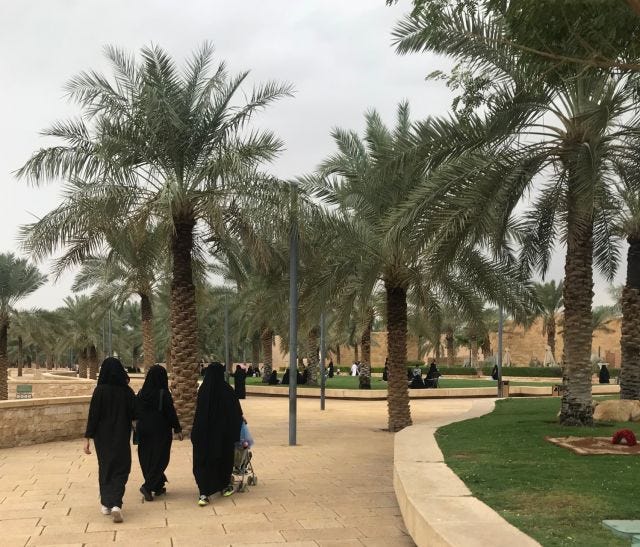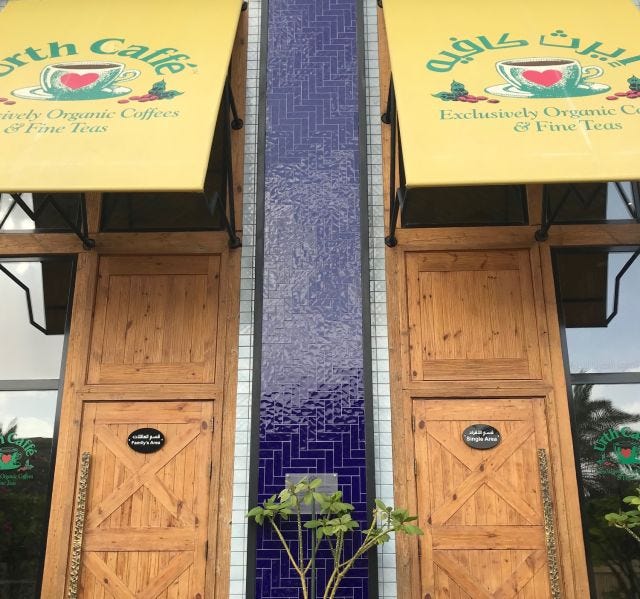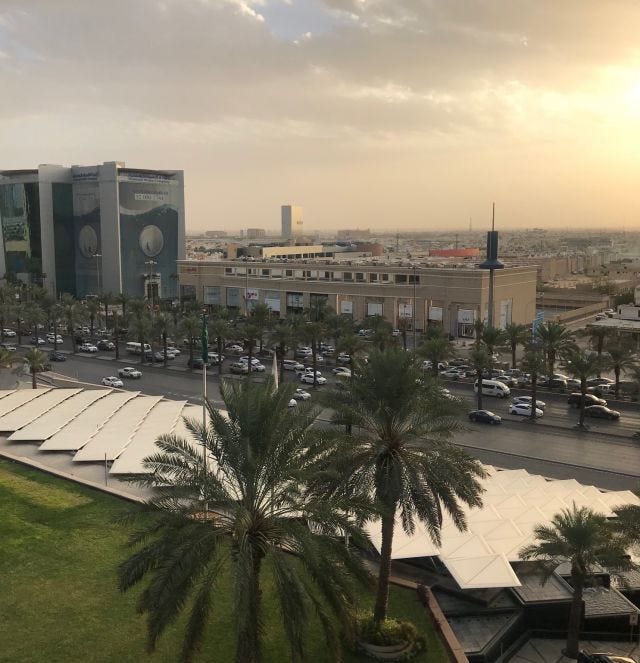Lady Business: My trip to Saudi Arabia, and what happens when the rules change
Hello and welcome to Lady Business, a weekly newsletter about women, the business world, and all the ways they overlap. You can sign up for Lady Business and read previous issues here. This is the fifty-ninth issue, published February 21, 2019.
Saudi Stories

(Reporting from Riyadh, at the top of the Al Faisaliah tower)
So, as I mentioned late last year, I went on a reporting adventure in early November to the Middle East. Which ultimately took me to Riyadh, the capital of Saudi Arabia -- on assignment as a journalist, a month after the horrific and high-profile murder of a Saudi journalist.
I was a little nervous! But also fascinated -- and, frankly, incredibly excited to get a chance to see a country that I never really expected to visit. I was also thrilled to get the opportunity to write the resulting feature story, a profile of Manhattan-based barre-fitness studio Physique 57 and how the two women behind it approached everything that American companies, large or small, have to consider about doing business in Saudi Arabia these days. The story is in Inc.’s upcoming March/April issue, and was published online yesterday:
The evening before we flew into Riyadh, [Physique 57 co-founder Tanya] Becker was worrying about her speech at the launch party. "Can we even talk about empowering women?" Could they use language that, especially at that tense time, might come across as overtly political?
It's a tricky balance for any company going into Saudi Arabia, where social change is both real and halting. Some stores, like the Starbucks below the new Physique 57, kick out patrons at prayer times and continue to enforce strict gender segregation. (The coffee company drew international criticism in 2016 when an internal wall dividing the sexes at a Riyadh Starbucks fell down, and the location banned women temporarily rather than allow them to use the men's entrance.)
… But other restaurants, like a chic sushi joint not far from the studio, seat women and men at neighboring tables. A group of women I met picnicking in Riyadh's historic Al Bujairi district let their headscarfs slip as they discussed their professional ambitions, as doctors and mathematicians and events coordinators; then they reattached their face veils to walk about in public, masked, anonymous.
This, I think, was my biggest surprise during the four days and change I spent in Riyadh: Parts of it were still extraordinarily restrictive by my American standards, but parts of it were unexpectedly relaxed -- and even familiar.
I knew, ahead of time, that Saudi women only recently got the right to vote, to drive, and to work out; they still have to have a husband or father or brother give them permission to leave the country; and oh yeah, they have to cover their bodies with the flowing abaya cloaks. (Which are a pain and a half to climb in and out of taxis in, especially in heels, especially when it’s raining.)

And yet, I was surprised by how open parts of Riyadh were. Even though many of the women I saw in public were fully veiled, I didn’t even cover my hair -- and was never harassed or made to feel rude about it. (Which may have been foreign privilege; admittedly, many of the women I saw without headscarves did not look Saudi.) I was also made to feel very welcome by almost every Saudi I did speak with, even those who were obviously suspicious of journalists.
And parts of Riyadh felt extraordinarily familiar. I kept on being reminded of Los Angeles: Mild, sunny weather; bad traffic; tall skyscrapers surrounded by urban sprawl, surrounded by desert; Starbucks and Shake Shacks and Forever 21s; an outdoor mall that one of the women I traveled with compared to The Grove. Heck, my first meal in the country was a kale salad at a branch of LA’s Goop-endorsed Urth Caffe:

And sure, there were two gender-segregated doors for this Urth Caffe -- women, or “families,” are supposed to use one, and men, or “singles,” the other -- but at least at the time I was there, women walked in and out of both, and were allowed to sit in both sections.
Yet the rules were also prone to change, sometimes by the day. At my very fancy Riyadh hotel, I ate breakfast at the same front table two days in a row. On the third day, the waiter apologetically stopped me as I was about to sit there again -- it was Friday, the start of the weekend, and now that front table was reserved only for men. Wouldn’t I please take a seat in the back?
It was mildly annoying -- being banned from where I wanted to sit, sure, but also just having the rules change without warning. Which is also part of that halting social progress, and what the story gets at for any business operating in Saudi Arabia. Politics aside, current headlines aside, reputational considerations aside: Can you talk about, say, empowering women? And if you can’t today -- or if you can -- what happens when, the next day, the rules change?

Lady Bits:
--Book stuff: I really enjoyed speaking with Joe Saul-Sehy for his Stacking Benjamins podcast; with George Krueger and Mary-Lynn Foster for their BIGG Success Show; and with Denise Griffitts for her Your Partner In Success Radio show. More to come!
--Happy hostless Academy Awards weekend! I’ll be cheering for my favorite movie of the year, Can You Ever Forgive Me?, and watching with friends who get extremely imaginative with their Oscars-themed food choices. (So if you have suggestions for how I can show my support for that movie through the food I bring -- other than showing up with a giant bottle of Scotch -- please let me know!)
--I unwound last weekend by finishing Broadchurch, or “Win British-actor bingo in one series with three Doctors Who, a Once and Future Queen, and my favorite modern-day Much Ado’s Beatrice.” (It’s great. They solve crime! In. Extreme. Slow. Motion.)
Thank you for reading, commenting, and subscribing to this newsletter! Please tell your friends to sign up here, let me know what you think about this week's issue, and what else you'd like to see me write about: maria.aspan@gmail.com


